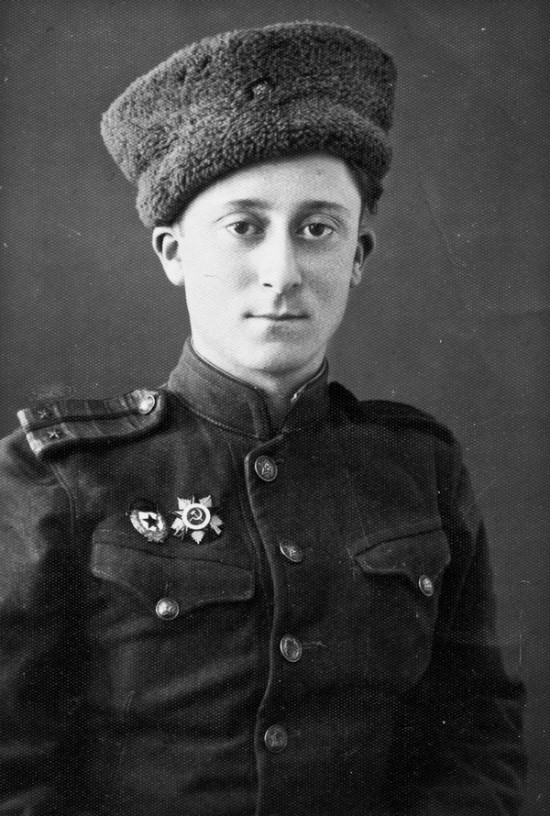Adolf Landsman was born in 1924 in Moscow, into the family of an administrative employee. By June 1941, when the Soviet-German war broke out, he had just completed the 9th grade of school. In early July, he volunteered to dig trenches in western Russia. Only in August was he able to return to Moscow. Landsman and his mother were evacuated eastward, where they were later joined by the father. In 1942, Landsman graduated from school, and was conscripted into the Red Army. He began his military service by attending an artillery school, and in April 1943 he completed his course and received the rank of lieutenant. In July 1943, in response to an urgent call, his anti-tank brigade was transferred to the Kursk Salient in the south, where the enemy was preparing an offensive. For the first six days, the anti-tank platoon commanded by Landsman was engaged in defense; the next week, his regiment launched a counter-offensive, and he was wounded. After being discharged from hospital, Landsman continued to serve in the anti-tank artillery. In 1944-45, he saw action in Belorussia, in the Carpathian Mountains, and in Hungary, where he was awarded the Order of the Patriotic War, 1st class. In January 1945, he was wounded once again. He finished the war in Czechoslovakia.
Landsman recalls that, although he would occasionally catch hostile looks ("The Jew can guess the thoughts of one who gives him an unfriendly look")1, his Jewish ethnicity was a boon, rather than a curse, to him. It was because of his last name, which was perceived as German by the Russians: surely, it was better to be a Jew than an ethnic German in the Red Army. As late as April 1945, Landsman took part in a battle where his platoon only narrowly escaped being taken prisoner by the Germans. After the battle, a comrade of his – an ethnic Russian sergeant who had been captured by the Germans early in the war, and had later escaped from a POW camp – told him:
"Lieutenant, we have just lived through a very serious battle that could have ended very badly for us. I endured much grief and suffering in captivity… I saw what the Germans were doing to your kin there".
He went on to suggest that, should they be captured, it would be better for both of them to commit suicide.2
Luckily for them, the war was over in a month.
Adolf Landsman recalls the reaction of his Russian comrade to the enemy's antisemitic leaflets
"In Belorussia, the Germans threw leaflets at us [and we had been ordered to destroy them unread] … And so, another gun commander says: 'Lieutenant, let's go into the forest, let's take a walk, I want to tell you something'. We went into the forest. He takes a German leaflet out of his boot: 'Look what the Germans are writing here.' I say: 'I won't read it, why didn't you tear it up?! And now you're giving it to me? Both of us will end up in the penal battalion for this.' He says: 'I will tear it up now, but I want you to read it first. No one will know about it, because we are alone here.' I began to read. On the whole, the leaflet ran as follows: 'Russian soldiers, you are fighting for the Jews who sit in Tashkent [Central Asia]. There are no Jews at the frontline, so why shed your blood protecting them? Surrender, come over to our side.' When I had finished the flyer, he tore it up and buried it in the ground. And then he said: 'Well, how can I trust this leaflet, when you and I eat from the same cookpot?! For whom is it intended?'"







